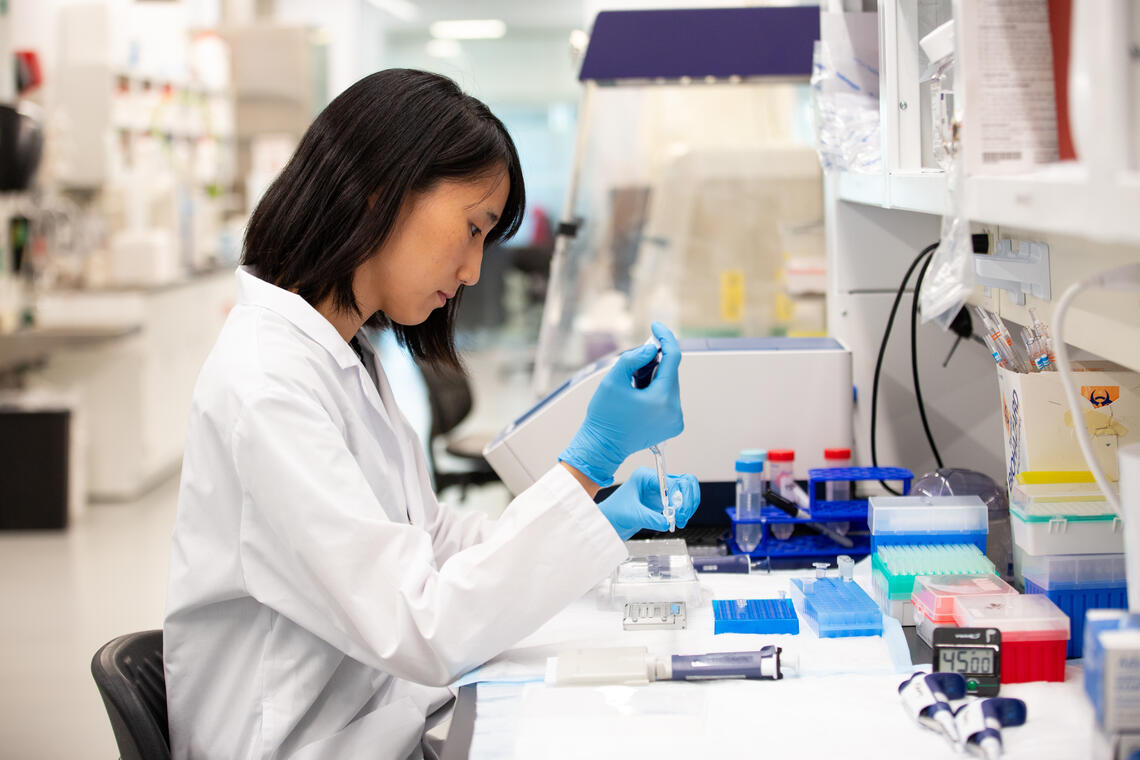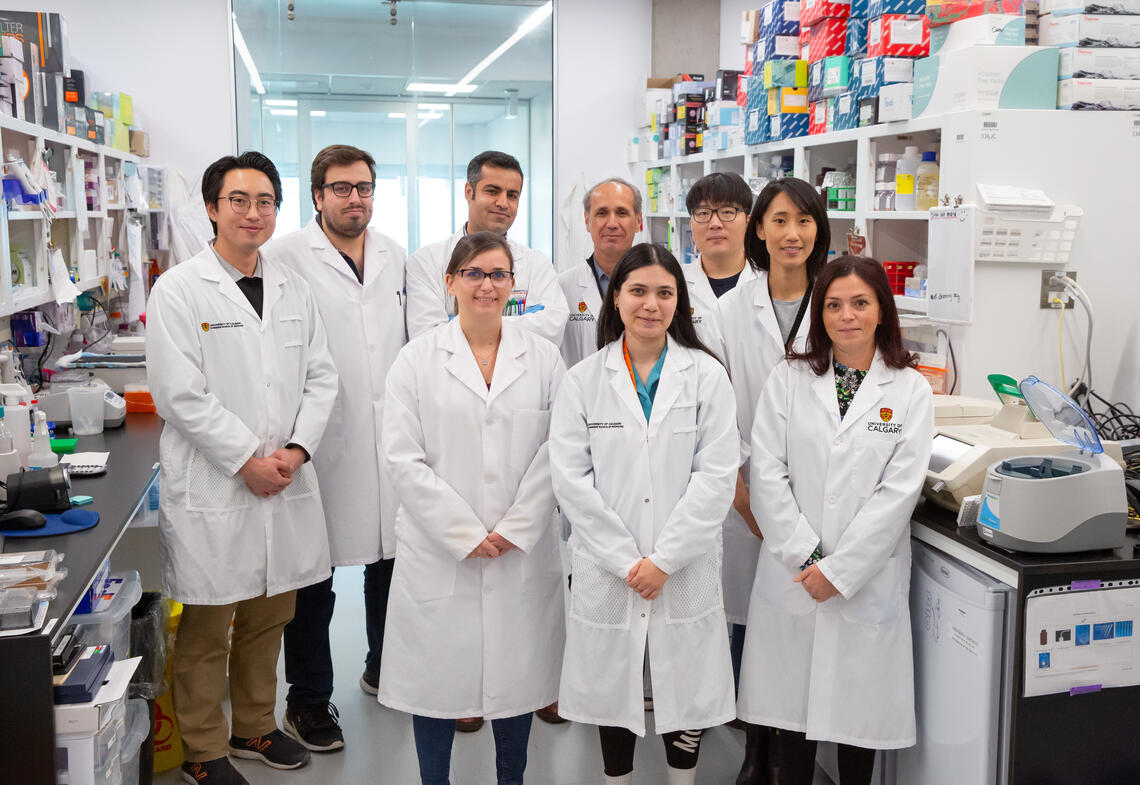Oct. 23, 2023
UCalgary and AHS researchers discover how multiple myeloma cells become resistant to immunotherapy

Lisa Mack is cancer free, for now, and looking forward to her 75th birthday in December. She was a participant in a clinical trial at the Tom Baker Cancer Centre (TBCC) that has helped University of Calgary and Alberta Health Services researchers better understand why multiple myeloma (MM) cells become resistant to immunotherapy.
“Despite promising results obtained by using novel immunotherapeutic approaches, every multiple myeloma patient relapses at some point. We wanted to understand why this happens in order to prevent disease relapse and develop better treatments for our patients,” says Dr. Nizar Bahlis, MD, associate professor at the Cumming School of Medicine (CSM) and senior author of the paper published in Nature Medicine.
The scientists obtained tumour samples from Mack and 29 other patients who were treated with chimeric antigen receptor T cell (CAR T) therapy and/or bispecific T cell engagers. Researchers separated the myeloma cells and subjected them to single cell sequencing to understand how these cells become resistant to these therapies. These immunotherapies go after two targets expressed on malignant plasma cell surface: B cell maturation antigen (BCMA) and G-protein coupled receptor family C group 5 member D (GPRC5D).

First author Holly Lee.
Riley Brandt, University of Calgary
“We found that the tumour cells escape the reach of immunotherapy by losing or changing these targets (BCMA, GPRC5D) on their surface,” says Dr. Holly Lee, MD, hematologist, PhD student, and first author of the paper. “When this happens, the tumor becomes invisible to the targeted therapy, like a strong signal that suddenly disappears from a radar screen.”
Dr. Paola Neri, MD, PhD, oncologist TBCC, Alberta Health Services and co-senior author on the paper, says the study revealed new understandings of MM cell behaviour that have never been documented.
“We have noticed that the tumour can also change and mutate, altering the target recognized by these therapies, making the tumour cells unrecognizable to the therapies,” says Neri. “Therefore, screening for these changes is key. If you know that the tumour mutations are present you can consider different targets or other therapeutic options, personalizing the treatment for our myeloma patients.”
Single cell sequencing is not a routine procedure for myeloma patients. Neri says the next step will be to develop a test that could be used to screen for these mutations and help guide therapy selection.

Lisa Mack, participant in UCalgary multiple myeloma study.
Courtesy Lisa Mack
“Our results suggest the importance of periodically profiling myeloma cells throughout a patient’s treatment course, ideally every three months. This proactive approach would enable us to adapt the treatment strategy in response to any tumour mutations that may arise,” says Bahlis. “As more immunotherapies are being developed it is critical to understand which ones will work the best and in which scenario.”
“Multiple myeloma is a very difficult cancer to treat. I’ve been cancer-free before, but it always comes back,” says Mack. “I was diagnosed 15 years ago and have undergone a lot of treatments including stem cell transplants and chemotherapy. I’m very grateful for my faith, the opportunity to participate in this clinical trial, and the research team.”
The Bahlis lab led this research and collaborated with investigators in Germany and the United States. Findings are published in Nature Medicine.
“The team, led by clinician-scientists Drs. Nizar Bahlis and Paola Neri, are truly leading the field nationally and internationally,” says Charbonneau Cancer Institute Director Jennifer Chan, MD, who highlighted that the team has now published five important papers on precision cancer medicine in the last seven months.
“These publications show what can be achieved when every research question drives toward clinical impact — and what can be achieved when bright minds, patients, patient samples, advanced technologies, and rigorous science come together.”
The Bahlis lab is supported primarily through philanthropy and research grants obtained from national and international societies such as the Terry Fox Foundation, Myeloma Canada, Alberta Cancer Foundation, Leukemia Lymphoma Society of Canada, International Myeloma Society, the Paula and Rodger Riney Multiple Myeloma Research Program Fund, and the Multiple Myeloma Research Foundation (MMRF).

Members of the Bahlis lab.
Riley Brandt, University of Calgary
Nizar Bahlis is an associate professor in the Department of Medicine at the Cumming School of Medicine (CSM) and a member of the Arnie Charbonneau Cancer Institute. He is a hematologist and attending physician in the Division of Hematology and Bone Marrow Transplantation at the Foothills Medical Centre.
Paola Neri is an associate professor in the Department of Oncology at the CSM and a member of the Arnie Charbonneau Cancer Institute. She is a medical oncologist and scientific director of the Precision Oncology Hub at Tom Baker Cancer Centre.
Holly Lee is a hematologist and postdoctoral fellow in the Clinician Investigator Program at the CSM.
The OWN.CANCER campaign is a once-in-a-generation opportunity to transform the landscape of cancer research, care and treatment with the goal of raising $250 million in support of Calgary’s new world-class cancer centre, the Arthur J.E. Child Comprehensive Cancer Centre. This game-changing initiative is backed by three trusted community institutions: Alberta Health Services, Canada’s first and largest fully integrated provincial health system; the University of Calgary, a globally recognized leader in medical research and home to tomorrow’s health-care professionals; and the Alberta Cancer Foundation, the official fundraising partner for all 17 cancer care centres across the province.







